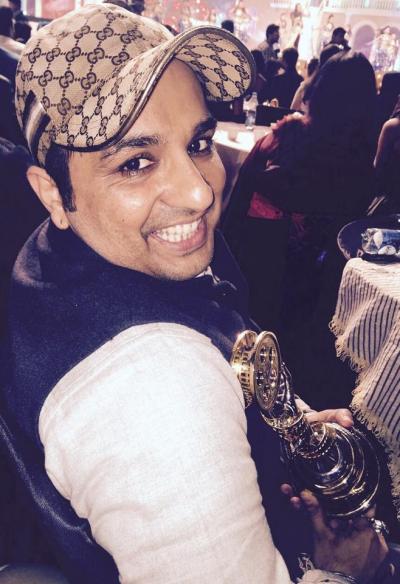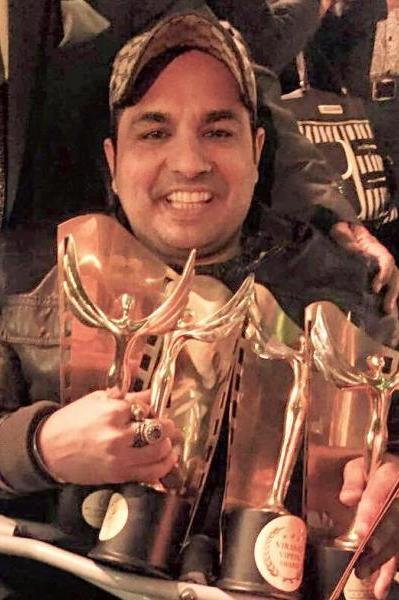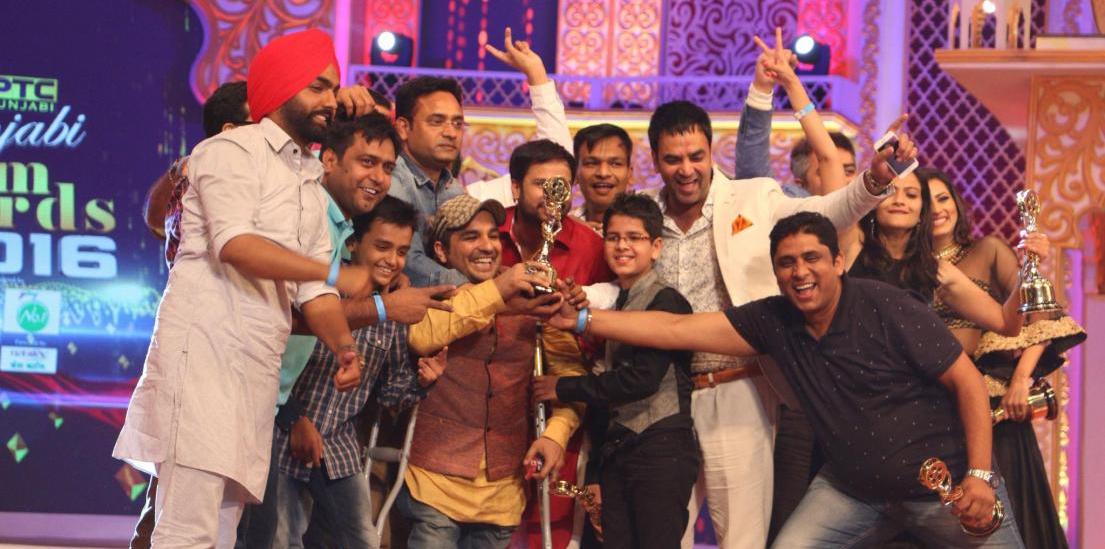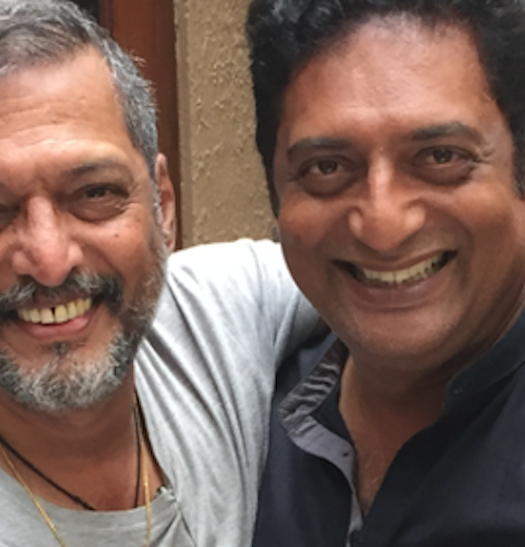Gurdas Maan is my God – Jatinder Shah
A rendezvous with music director Jatinder Shah is beyond ordinary. People say that he doesn’t really believe in giving interviews, and he too agrees that he isn’t comfortable with the entire process. But if you indulge him in a dialogue that is high on philosophy, life and discovering the various meanings of life and music, Shah will be kind enough to give you more than an hour from his busy schedule. His musical career, which includes compositions for almost every successful Punjabi film, is full of rich experiences and interesting anecdotes. In a conversation with Pandolin, Shah speaks his heart out about his tryst with music, climbing the ladder of success and his unconditional love for Gurdas Maan.

Music Director Jatinder Shah
Tell us about your earliest stint with music. How did you get into the field and your training in it?
I was born in Amritsar and raised in Chandigarh. I had sitar as a subject during my graduation at SD College, Chandigarh. I used to be a very shy kid and would not sing in front of anyone. During my college, I started learning music from my godfather Varinder Bachan ji. My friends would always encourage and appreciate me. They have a significant contribution in helping me reach where I am today. They would take me to my music classes and keep waiting outside till the class was over.
Theatre director Sahib Singh added the title of ‘Music Director’ before my name when I started composing music for his plays. In 1999, I did my first telefilm, which was then followed by another telefilm. The producers of the telefilm then offered me their feature film, which brought me to Mumbai in 2004. While working on that project, I stayed in Mumbai for six months and for the first time; I got to work with legends such as Asha Bhosle, Udit Narayan and Shankar Mahadevan. After finishing the film I decided to stay back in Mumbai for some time. Then I met lyricist Raj Kakra ji with whom I composed an album for singer Manpreet Akhtar. And the rest is history.
Was it easy to get a break in the Punjabi music industry and then in films?
I met singer Satinder Sartaj through a common friend. By then I had already composed music for 3-4 albums. Sartaj was a very different singer with a unique style of singing. I did his debut album ‘Sartaj’ that became very popular. Sartaj and I then did three albums together with Speed Records. My entry into the Punjabi film industry was with a song in Jihne Mera Dil Luteya that got quite popular. And then in 2011 I made a full-fledged entry in the industry with two films by Speed Records – Sirphire and Mirza. It was followed by leading Punjabi films like Jatt & Juliet, Carry On Jatta, Singh Vs Kaur, Jatt & Juliet 2, Goreya Nu Dfa Karo, Jatt James Bond, Punjab 1984, Sardaaji, Sardaarji 2, Farar, Angrej, Ardaas, Ambarsariya, Bambukaat et al.
READ: SARDAARJI 2 – REDEFINING ENTERTAINMENT WITH DILJIT, SONAM & MONICA
Would you say that your journey of making music for over 50 Punjabi films and two Hindi films was easy and smooth?
There is no substitute for hard work. Though everything in your life happens through God’s will. I work for around 16 to 18 hours a day and I still get nervous before the release of any project. There is no formula that can make every song a hit. Only hard work helps. A lot in life also depends on your time and situation. At times, things don’t work out; no matter how hard you try. I’ve been lucky to get the chance to work with talented people. The biggest thing for me is that, in my journey, I have had the chance to get close to Maan Sahab (Gurdas Maan, singer-actor). In Punjab, it is every artist’s dream to work with him. I’ve also been lucky to have the support of singers such as Diljit (Dosanjh), Amrinder (Gill), Sartaj, Gippy (Grewal), and directors like Anurag bhaji (Singh), Simerjit (Singh), Pankaj (Batra). In fact, Speed Records have also played a key role in showing confidence in my work. Besides the music for songs, I would often show a desire to compose the background score as well, which they always agreed for.
Speed Records have also played a key role in showing confidence in my work
Ki Banu Duniya Da featuring Gurdas Maan and Diljit Dosanjh that you composed for Coke Studio gained a lot of appreciation. What kind of an experience was that?
It was a very filmy experience. Last year, on August 4, I got a call from MTV Coke Studio. They wanted to do the song in a week. So I started working on it the very next day. Our first meeting happened on August 6 to decide on how to go about it. Maan sahab’s wife, Manjeet ma’am (Maan, producer), wanted us to record it live. We did around five-six rehearsals and then recorded it live. Though all the other songs that appeared in that episode (Season 4 Episode 5 – Independence Day special) were not live.
What kind of a bond do you share with Gurdas Maan?
I met him for the first time in 2012. Manjeet Ma’am called me to their office for a meeting. It was a huge thing for me and I was filled with a number of emotions; I was nervous, excited and overwhelmed, all at the same time. I simply couldn’t understand what was happening with me. When I reached the office, I didn’t spare a second in looking around, went straight to Manjeet ma’am and immediately asked her about Babaji (Gurdas Maan). And when she instantly told me that he was sitting right there, right next to me, I was totally stunned and astonished. Surprisingly, he was actually sitting there, wearing a cap. I was in shock and so overwhelmed when I saw him, tears automatically rolled down my cheeks. I was so amazed that I couldn’t believe my eyes. It was a surreal experience. Every time that I meet him, I feel like I’m meeting him for the first time. I have a very different bond with him that I can’t really explain. As an artist, the amount of respect and love that he has gained from the whole of Punjab is endless. I consider him my God.
As an artist, the amount of respect and love that Gurdas Maan has gained from the whole of Punjab is endless

With Gurdas Maan
You have been in the industry for so long. What are the changes that have occurred in the making of music?
My first recording took place in 1999. So I have seen the phase when instruments were recorded live. Then with each year, a change and upgradation in technology kept happening. Earlier the platforms were limited. And a song would take a lot of time to travel through cassettes and CDs. Now it reaches you in a fraction of a second. The Internet and media have no doubt made everyone popular in a short span of time. For instance, my last film Bambukaat released a few weeks back and immediately the next question was, ‘What is your next project?’ It is more difficult to work in today’s time. Earlier when 20 musicians would record together for a song, it was obvious that the song would have the talent and creativity of all those 20 minds. But now when only the music composer records everything separately, the entire responsibility comes on his shoulders. Earlier there was a temperament to learn. Now you don’t find it anywhere.
The best part about technology these days is that one can immediately mail the track once it is complete. But everything is moving at such a fast pace that one’s competition with one’s own work is increasing day by day.
READ: WE NOW LIVE IN A WORLD WHERE MUSIC BELONGS TO EVERYONE – MIKEY
What thought goes into the selection of your projects?
My first concern is the director, because I need to have some kind of freedom in the films that I do. And if the team is the same that I have worked with earlier, then I don’t have any concern about anything. When a new director or producer approaches me, then one is definitely worried about the script, cast etc. If the people you are working with are not good or creative, then you can’t come up with a good product. It is the people who make it popular. Otherwise, songs and stories already exist in books.
What is your process of making music for a Punjabi film like?
We do various sittings in which we listen to the script and the idea of putting the song in the particular space. My duty is to think and ensure that people should appreciate any song that I make. Punjab is the only place that still comes up with albums and has an established and successful music industry. People here don’t really keep the song limited to the film. They enjoy the music separately too. In Punjab, music has a lot of value. People love music here.
Whenever I’m making any song, I try that the melody is close to its region and roots. I want that when a listener is listening to the song, he or she should not have an impression of a particular artist or a composer. They should just find it as a song irrespective of all other details.
Punjab is the only place that still comes up with albums and has an established and successful music industry
The music of all the films that you have composed so far has been a huge hit. What do you think makes it so popular amongst listeners? Whom would you give credit for that?
Saiji di kirpa (God’s grace). I owe every success of mine to God. The amount of love I get for my work from every side makes me work constantly and deliver consistently. When there is so much love around, you want to work harder. There is no rule or mantra for making your songs popular. It is only dedication that matters. I would like to give equal due and respect to my lyricists and directors for helping me take the song ahead in the right manner. When you are working with lyricists such as Happy Raikoti, Kumaar, Raj Kakra ji, Gurpinder Nathumajra, Maninder Kailey, Balbir Boparai and Babbu Singh Maan, the results are sure to be brilliant.
READ: AN INSIDER’S GUIDE TO BEING A MUSICIAN BY AMAAL MALLIK

With multiple awards received at Virasat International Punjabi Film Festival and Awards (2016) at Melbourne
But we all face situations when things don’t work despite the constant hard work. Did you also come across anything like that? What kept you going?
I have fallen many times in my life. But then I believe in standing up again. Life is not always the same. I’m lucky that I stay in a city like Mumbai. It has fulfilled the dreams of many. If one is always focused, then no matter what the situation is, you’ll eventually succeed. I once heard from someone that when your time is good, you should invest in good work and people and not really waste it. Unfortunately, if bad times occur, then the investment that you made in your good time will help you.
Also, we should never lose hope, no matter what. We just need to find out our true calling and strengths. Babaji (Gurdas Maan) once wrote a song called ‘Boot Polisha’. It has certain lines that changed my life. They go like – Marna tan sabne hai, avain maru maru kyun karna, marjaneya maana ve, jeaunde ho jaye essa marna, lad lag ke mar jayiye, kise de sir chad ke na mariye, roti haq di khaiye ji, bhave boot polisha kariye…. From living life to the fullest to earning your own bread and butter and surrendering yourself to someone; it beautifully describes the entire philosophy of life. There was another song that had a line, Ghar bhul gayi mod te aake… Even this line has a deep meaning. It says that we often give up when we’re just about to reach our target. We get disillusioned just when we are going to win the race. My Guruji would often say that when you feel that your entire energy is completely drained, just keep in mind that it is the beginning and not the end. These simple philosophies of life keep me going and focused.
If one is always focused, then no matter what the situation is, you’ll eventually succeed
What kind of music do you listen to? And who are your favorite composers?
I love every kind of music. But Punjabi folk, classical, ghazals, nazams, Pakistani sufi songs and old Hindi Bollywood songs hold a special place. I have always loved Laxmikant Pyarelal, R D Burman and Madan Mohan’s music.
Is the Hindi film industry also on your mind?
Fortunately, I have never been over ambitious. I’m doing quite well in the Punjabi industry. Not that I don’t want to do Hindi films, but there is still so much to be done in the Punjabi film industry. If I get a chance to make music for Bollywood films, I will definitely do it. But I won’t leave Punjabi films just because I want to do Hindi films. There are a few Hindi films that I’m doing with some prominent banners in Bollywood. They’ll be announced by next year.
READ: I WON’T STOP MY CAREER IN PUNJABI FILMS TO MAKE A HINDI FILM – NAVANIAT SINGH



